Contact center platforms are deeply embedded in your infrastructure since migrations are costly, integrations are rarely simple, and technical debt adds up fast. As 92% of organizations adopt AI for CX, IT leaders are under pressure to deliver scalable, integrated systems without ballooning complexity1. This Avaya vs. Genesys comparison highlights architectural tradeoffs, deployment realities, and where Nextiva could offer a more unified, lower-friction alternative.
Choosing the right contact center software is a critical decision. It’s deeply integrated into your business processes and teams, and switching solutions is a big undertaking. That’s why getting it right the first time is paramount. Avaya and Genesys are two of the most prominent names in the contact center industry.
In this comparison, we’ll dissect the pros, cons, and key features of Avaya and Genesys to help you make an informed choice.
Avaya vs. Genesys: Head-to-Head Quick Comparison (2026)
Before we dive into the detailed pros and cons, here’s a high-level comparison of Avaya and Genesys:
| Feature | Avaya | Genesys |
|---|---|---|
| Best for | Larger enterprises, complex deployments | Mid-market to enterprise, omnichannel focus |
| Pricing model | Tiered, contract-based | Tiered, usage-based components |
| Overall G2 score | 4.1/5 (181 reviews) | 4.4/5 (1,488 reviews) |
| Ease of use (G2) | 8.4/10 | 8.9/10 |
| Ease of setup (G2) | 7.5/10 | 8.4/10 |
| Quality of support (G2) | 8.2/10 | 8.2/10 |
| AI capabilities | Yes, including noise cancellation | Robust AI, chatbots, voicebots |
| Integrations | Salesforce, MS Office 365, etc. | Extensive CRM, WFM, and app marketplace |
| Key strength | Feature depth, on-premise options | Omnichannel experience, scalability |
| Drawback | Cost, potential latency | Complexity, reporting limitations |
Note: G2 scores are approximate and can change. Always check current reviews for the specific products you’re considering.
Avaya vs. Genesys: The Pros
Let’s dive into the individual strengths of both Avaya and Genesys.
Pros of Avaya
Avaya is popular among users for its flexibility, suite of integrations, and established presence.
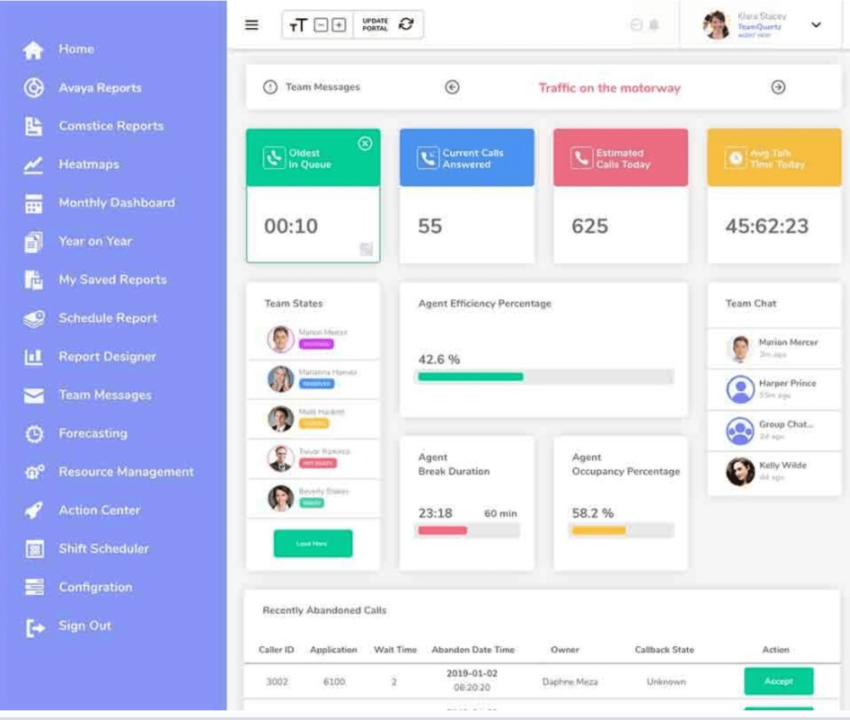
Flexibility
Avaya solutions are designed to support a distributed workforce. Unlike some traditional phone systems, Avaya’s IP-based solutions can be used anywhere with internet access, crucial for hybrid teams. Call transferring is smooth, and setup can range from DIY to professional deployment depending on complexity.
Integrations and customization
Avaya offers robust integration capabilities, including with on-premises voice PBX and third-party software like Salesforce CRM, ServiceNow, and Microsoft Office 365. These integrations help build a more comprehensive contact center. Customization options allow tailoring the contact center workflow, though this can sometimes add complexity.
Innovative features
Avaya continues to offer advanced capabilities, including AI noise cancellation, personalization features, and agent dashboards providing real-time call center status. Its AI noise cancellation enhances clarity for both agents and customers.
Workforce engagement
You get tools for workforce engagement, including quality management systems for omnichannel interaction tracking and workforce management features such as gamification and text analytics to boost your contact center’s productivity.
Full-spectrum management
Avaya is an all-in-one solution with comprehensive reporting (over 120 real-time and historical reports), business integration, and various deployment options, enabling agents to identify issues, provide personalized support, and track key metrics.
Pros of Genesys
Genesys is known for its cloud offerings, AI-driven innovation, and omnichannel capabilities.
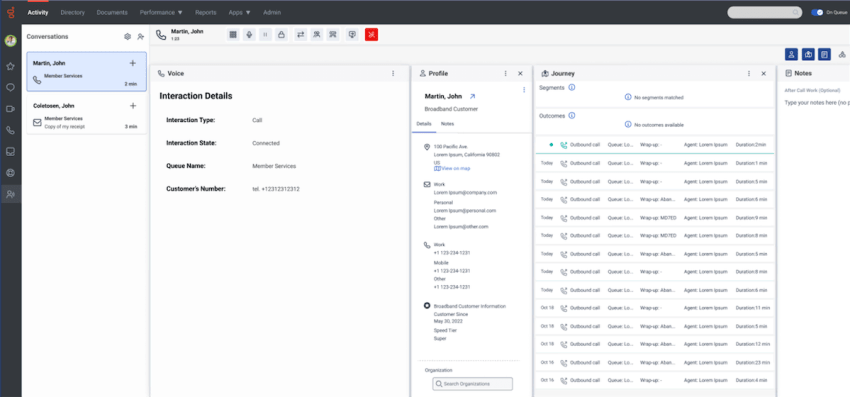
Self-service tools
With customers increasingly seeking self-service, Genesys provides strong options like interactive voice response (IVR) for automated call routing, voicebots, and chatbots, enabling 24/7 omnichannel support across channels.
Agent support tools
Genesys empowers agents with tools to streamline workflows. Features like agent scoring for skill-based call routing and multi-channel ticket management help coordinate customer conversations effectively.
Ease of use and configuration
While some Genesys products can be complex, users praise Genesys Cloud CX for its more intuitive interface, configurable views, streamlined agent management, and dashboard creation.
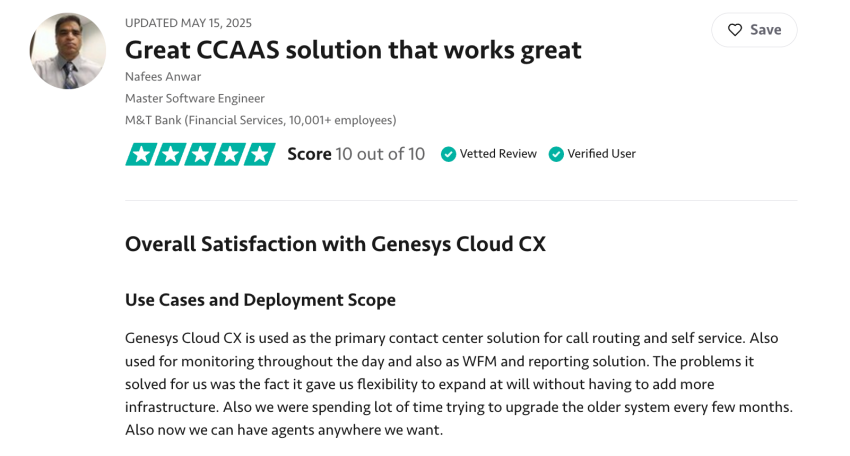
Automated outbound campaigns
Genesys offers tools for creating multichannel marketing campaigns, including proactive notifications and advanced list management. Progressive notifications alert agents to live campaigns, allowing them to join and manage calls efficiently.
Seamless migration and usability
Particularly with Genesys Cloud CX, customers report a smoother migration path and appreciate the platform’s usability when integrating into existing business workflows.
Avaya vs. Genesys: The Cons
Despite their capabilities, both platforms have areas where users report challenges.
Cons of Avaya
Common concerns with Avaya revolve around latency and operational costs.
Latency issues
Some users report experiencing app delays or high latency, which can hinder virtual call center operations where responsiveness is key. This could impact call transfers and customer experience.
Service interference
Occasional downtime or service issues can affect call quality and connection. Users have reported instances of system errors leading to abruptly disconnected calls.

Pricing transparency
Avaya’s contact center, rebranded as Avaya Infinity Platform, isn’t publicly listed and requires direct sales engagement.
Cons of Genesys
The biggest cons of Genesys are the complex interface and the lack of advanced reporting.
Complexity for some users
While Genesys Cloud CX is more user-friendly, the broader Genesys ecosystem can be complex. Some users find that expert knowledge is needed for full deployment and utilization, and the wealth of features can sometimes be overwhelming without proper training.

Administration and reporting
Some G2 user reviews suggest dissatisfaction with the customization options in reporting and dashboards. Certain specific metrics, like longest wait time, might require custom configuration or API usage, which can be resource-intensive for non-technical teams.
Occasional issues with calls
Other Genesys users have reported occasional poor call connectivity or performance issues, especially during platform updates, which can be frustrating during live customer interactions.

Comparing Avaya and Genesys vs. Nextiva
Given the shortcomings of both Avaya and Genesys, businesses are understandably exploring alternatives that might offer a better fit, particularly in terms of value, ease of use, and reliability.
Here are a few areas where Nextiva’s contact center solutions outshine Genesys and Avaya.
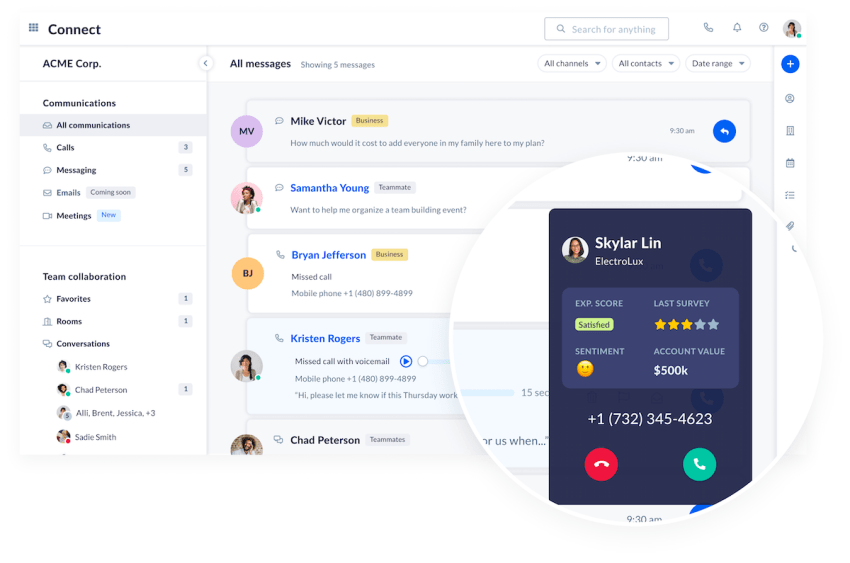
1. Ease of use and implementation
Nextiva has an impressive 4.6 out of 5 ease of deployment user rating on Gartner Peer Insights:
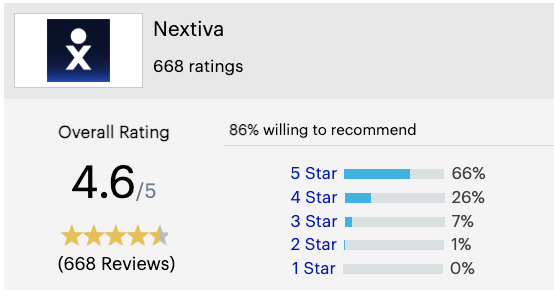
Something that stands out to our customers is how easy it is to set up Nextiva. You can implement it yourself in minutes, even if you’re not a tech whiz. We provide detailed implementation guidelines, plus our team is always on deck to answer your questions and walk you through the process.
The user experience is great, too. Unlike Genesys, where customization gets in the way of usability, Nextiva’s interface is clean and organized, making it easy to find the features and tools you need. Hear from our users:

2. Pricing transparency and value
There’s no hide-and-seek for Nextiva’s pricing plans. You don’t have to “talk to sales” to know how much each plan costs or compare their features. You’ll find all this information on our website to help you make an informed decision quickly.
Compared to Avaya and Genesys, Nextiva’s plans are more flexible. Take Genesys, for example. It charges a usage-based fee that quickly racks up for businesses with variable call volumes. This is on top of hefty upfront implementation costs.
Nextiva, on the other hand, only charges a monthly subscription fee. You can also opt for a contract term to save more on plans.
3. Customer support and reliability
Reliable service and customer support are two of the most important things to consider when choosing a contact center solution — and Nextiva checks both boxes.
With 99.999% uptime and continuous network monitoring, a Nextiva-powered contact center experiences virtually no service disruptions. That can’t be said for Avaya, whose users experience frequent service and call quality disruptions.
Nextiva also provides reliable customer support across all plans and multiple channels. Our support team is available via email, in-app chat, and phone calls. You can also troubleshoot issues using information from our extensive knowledge base. Here’s how one customer describes their experience with our support team:
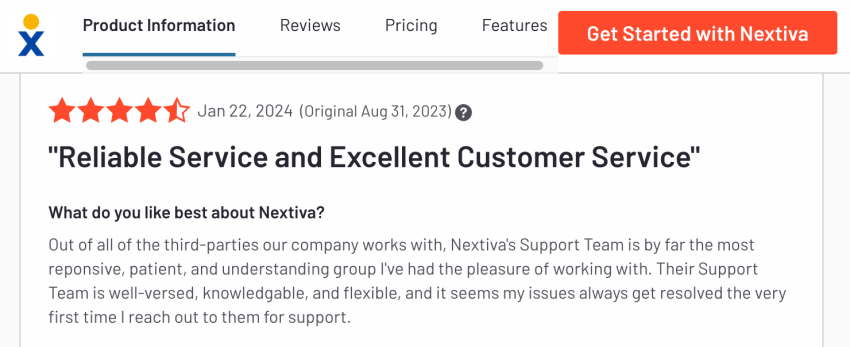
Avaya and Genesys offer strong support, but it’s not as consultative and white-glove as Nextiva’s.
Ready for a Contact Center Solution That Aligns With Your Needs?
You’ve dived deep into the Avaya vs. Genesys comparison, weighing their extensive features against complexities and costs. If your takeaway is that you need a powerful, enterprise-grade contact center that also delivers simplicity, transparent value, and reliability, then it’s time to see what Nextiva offers.
Many businesses researching Avaya and Genesys find Nextiva to be a strong alternative that provides robust UCaaS + CCaaS capabilities without the traditional drawbacks.
- Transparent pricing: No hidden fees, just clear, predictable costs.
- Effortless ease of use: An intuitive platform your team can adopt quickly.
- Stellar reliability & support: 99.999% uptime and award-winning 24/7 assistance.
- Seamless integrations: Connect with your CRM, helpdesk, and other essential business tools.
- AI-powered insights: Leverage modern AI to enhance agent productivity and customer satisfaction.
Get the best contact center capabilities.
Try Nextiva’s AI-powered contact center that truly empowers and makes your business smarter.
Frequently Asked Questions
Avaya is preferred by large enterprises with existing Avaya infrastructure or those requiring highly customizable (albeit potentially complex) on-premises or hybrid solutions. Genesys excels at delivering comprehensive, AI-powered, omnichannel cloud contact center solutions, particularly for mid-sized and large enterprises focused on digital transformation. Key differentiators include their primary target markets, pricing structures, and the ease of use of their respective platforms.
Nextiva is an excellent alternative, especially for small and medium-sized businesses. It offers a powerful combination of unified communications (UCaaS) and contact center (CCaaS) capabilities, while emphasizing ease of use, transparent pricing, and excellent customer support — areas where Avaya and Genesys can be challenging for smaller companies.
AI is no longer a novelty; it’s a core component of competitive contact center software. It’s crucial for automating routine tasks (chatbots, voicebots), intelligent call routing, real-time agent support, generating actionable insights from customer interactions (sentiment analysis, trend detection), and personalizing customer journeys. Platforms that don’t invest heavily in practical AI features are falling behind.

















 VoIP
VoIP 












